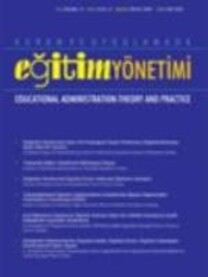Küreselleşme ve Lizbon Eğitim 2010 Hedefleri
Bu makalede küreselleşme kapsamında Lizbon 2010 Eğitim Hedefleri ve bu hedeflerin Türkiye eğitim sistemine etkilerine ilişkin genel bir değerlendirme sunulmaktadır. Küreselleşme kavramının, üzerinde herkes tarafından uzlaşma sağlanan bir tanımı yapılamadığından, Lizbon 2010 Eğitim Hedeflerinin etkilerinin küresel boyutu ile incelenebilmesi için öncelikle, küreselleşme kavramının sınırları tanımlanmaya çalışılmıştır. Bu makalede küreselleşme, analitik bir kavram olarak ele alınmış ve boyutları ve etkileri bakımından tanımlanmıştır. Küreselleşmenin boyutları tanımlanarak, küreselleşme-eğitim ilişkisi ve küreselleşmenin eğitim sistemlerini nasıl etkilediği tartışılmıştır. Küreselleşme kavramı ve küreselleşme-eğitim ilişkileri konusunda oluşturulan çerçeve kullanılarak, Lizbon 2010 Eğitim Hedeflerinin küresel boyutta Türkiye eğitim sistemine etkileri değerlendirilmiştir. Sonuç olarak, Türkiye'nin Lizbon 2010 Eğitim Hedefleri'ne yaklaşımı, AB-küreselleşme yandaşı yada karşıtı olma yerine, bu süreci ulusal kalkınma için fırsata dönüştürme ve bu hedefler doğrultusunda eğitim sistemini geliştirme arayışı olmalıdır.
Anahtar Kelimeler:
küreselleşme , lizbon Hedefleri
Globalization and Education 2010 Lisbon Objectives
Lisbon Education 2010 Objectives and their effects on Turkiye's education and training system within the context of globalization is examined in this article. Since there has been no agreed definition of the globalization, to examine effects of Lisbon Education 2010 Objectives on Turkiye's education and training system in terms of globalization, an attempt is made to define aspects of globalization. The concept of globalization is defined in terms of its aspects and effects with an analytical perspective. Relationship between globalization and education and effects of globalization on education is discussed. Based on defined conceptual framework for globalization and globalization-education relationship, effects of Lisbon Education 2010 Objectives on Turkiye's education and training system is discussed. It is concluded that, rather than taking an advocative approach for or against EU/globalization, the process of Education 2010 should be valued as an opportunity for developing education and training system and national development.
Keywords:
globalization , lisbon objectives,
___
- Brown, Tony. (1999). Challenging Globalization as Discourse and Phenomenon. International Journal of Lifelong Education, 18(1), 3-17.
- Dale, Roger. (2000). Globalization and Education: Demonstrating A ‘Common World Educational Culture’ or Locating A ‘Globally Structured Educational Agenda’? Educational Theory, 50(4), Fall2000.
- Dale, Roger ve Susan L. Robertson. (2002). The Varying Effects of Regional Organizations as Subjects of Globalization of Education. Comparative Education Review, 46(1), 10-36.
- European Council (EC). (1999). Joint Declaration of the European Ministers of Education. The Bologna Declaration of 19 June 1999. The European Higher Education Area.
- European Council (EC). (2000). Lizbon European Council 23 and 24 March 2000. Presidency Conclusions.
- European Council (EC). (2001). Report from Educational Council to the European Council on the Concrete Future Objectives of Education and Training Systems. Brussels, 14 February 2001, 5980/01.
- European Council (EC). (2002a). Council Resolution of 27 June 2002 on Lifelong Learning. Official Journal of the European Communities, C 163/01.
- European Council (EC). (2002b). Maastricht Communiqué on the Future of Enhanced European Cooperation in Vocational Education and Training (VET). (Review of the Copenhagen Declaration of 30 November 2002).
- European Council (EC). (2003a). Commission Staff Working Document. Implementation of the “Education & Training 2010” Programme. Commission of the European Communities. Brussels, 11.11.2003.
- European Council (EC). (2003b). Council Conclusions on Reference Levels of European Average Performance in Education and Training (Benchmarks). Council of the European Union. Brussels, 7 May 2003, 8981/03.
- Green, Andy. (1999). Education and Globalization in Europe and East Asia: Convergent and Divergent Trends. J. Education Policy, 14(1), 55-71.
- Henry, Miriam; Lingard, Bob; Rizvi, Fazal ve Sandra Taylor. (1999). Working with/against Globalization in Education. J. Education Policy, 14(1), 85-97.
- Magrath, C. Peter. (2000). Globalization and its Effects on Higher Education Beyond the Nation-state. Higher Education in Europe, XXV(2), 251-258.
- Marginson, Simon. (1999). After Globalization: Emerging Politics of Education. J. Education Policy, 14(1), 19-31.
- Rinne, Risto. (2000). The Globalisation of Education: Finnish Education on the Doorstep of the New EU Millennium. Educational Review, 52(2), 131-142.
- Tikly, Leon. (2001). Globalisation and Education in the Postcolonial World: Towards a Conceptual Framework. Comparative Education, 37(2), 151-171.
- ISSN: 1300-4832
- Yayın Aralığı: Yılda 4 Sayı
- Başlangıç: 1995
- Yayıncı: Pegem Akademi Yayıncılık Eğitim Danışmanlık Hizmetleri Tic. Ltd. Şti.
Sayıdaki Diğer Makaleler
Öğretmenliğe İlişkin Tutumların Özgecilik ve Atılganlık Düzeyleri Açısından İncelenmesi
A. Esra İŞMEN, S. Armağan YILDIZ
Bilişötesi ve Yapılandırmacı Öğrenme Çevreleri
Nilüfer ÖZABACI, Bahaddin ACAT
İlköğretim Okulu Öğrencileri Okullarında Hangi Durumları Problem Olarak Algılamaktadır?
Tezsiz Yüksek Lisans Öğretmen Adaylarının Öğretmenlik Yeterlikleri Üzerine Değerlendirmeleri
Hasan ŞEKER, Sabahattin DENİZ, İzzet GÖRGEN
